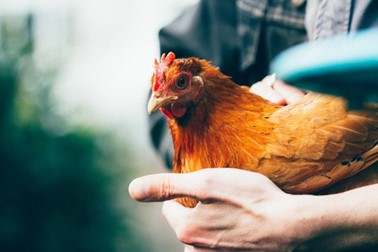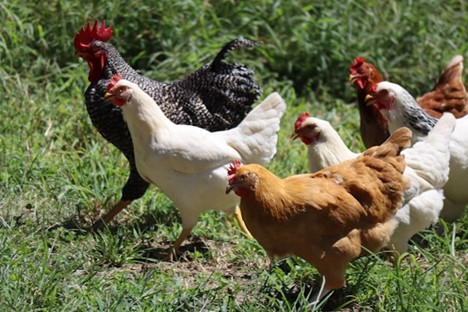Nikki Childrose of New York owns and operates a small family farm and roadside stand. In the following article, Nikki Childrose discusses essential practices for raising happy and healthy chickens on a small farm, or even in a backyard.
For farm owners, raising chickens can be a fulfilling and rewarding experience. Not only do chickens provide fresh eggs and meat, but they also contribute to sustainable farming practices by providing natural pest control and fertilizing soil. However, ensuring the health and happiness of your flock requires proper care and attention.
Nikki Childrose on Providing Adequate Flock Housing
Start by providing your chickens with a safe and comfortable coop or housing structure. The coop should offer protection from predators, inclement weather, and extreme temperatures, while also allowing an area to access the outdoors. Ensure adequate ventilation, insulation, and natural light within the coop to promote air circulation and prevent moisture buildup. Provide nesting boxes for egg-laying hens and roosting bars for resting at night.
Maintain Cleanliness
Maintaining cleanliness within the chicken coop is crucial for preventing disease and promoting overall health. Regularly remove soiled bedding, droppings, and debris from the coop floor and nesting boxes. Nikki Childrose of New York suggests using absorbent bedding materials, such as straw, wood shavings, or hay, to keep the coop dry and odor-free. Clean and sanitize waterers and feeders frequently to prevent contamination.
Offer Nutritious Feed
Nikki Childrose of New York also notes that it’s important to provide your chickens with a balanced diet consisting of high-quality feed formulated specifically for their nutritional needs. Choose products that are appropriate for their age, breed, and purpose, whether it’s laying eggs or meat production. Supplement their diet with fresh fruits, vegetables, and kitchen scraps to provide additional nutrients and encourage foraging behavior. Ensure access to clean, fresh water at all times.
Encourage Free Range or Pasture Access
Allowing your chickens to free-range or graze on pasture is essential for their physical and mental well-being. Free-range chickens have the opportunity to engage in natural behaviors, such as pecking, scratching, and dust bathing, which helps to prevent boredom and reduce stress.
Another important practice is to consider rotating the chickens on pasture areas regularly to prevent overgrazing and maintain soil fertility. This is often more of a common practice in spring, summer, and fall. Often, farmers need to secure their chickens indoors in winter, in either a large hoop house, or barn. However, it is still essential to provide chickens outdoor access in winter. If available, put down a bed of hay over snow so that the hens will be encouraged to make the trek outdoors if the run is not protected from the elements.
Practice Biosecurity
Implement biosecurity measures to protect your flock from infectious diseases and parasites. Nikki Childrose of New York says it’s essential to quarantine new birds before introducing them to the existing flock to prevent the spread of illness. Keep wild birds and rodents away from the chicken coop, as they can transmit diseases. Practice good hygiene habits, such as washing hands and wearing clean clothing when handling chickens or their eggs.
 Monitor Health and Behavior
Monitor Health and Behavior
Regularly observe your chickens for signs of illness, injury, or abnormal behavior. Common indicators of health issues include lethargy, loss of appetite, abnormal droppings, respiratory symptoms, or changes in egg production. Consult a veterinarian if you notice any concerning symptoms or if you have questions about your chickens’ health.
Provide Enrichment
Nikki Childrose of New York explains that enrichment activities are essential for keeping chickens mentally stimulated and prevent boredom. Provide environmental enrichment, such as perches, roosts, branches and toys, to encourage physical activity and natural behaviors. Allow chickens to explore and forage in the outdoor environment, providing access to vegetation, insects, and natural materials for nesting and dust bathing.
Practice Humane Handling
Handle your chickens with care and respect, using gentle and humane handling techniques. Avoid chasing or rough handling that can cause stress or injury to the birds. Use calm and quiet voices when interacting with chickens and allow them to approach you on their terms. Nikki Childrose of New York says to build trust and positive relationships with your flock through regular, positive interactions.
Conclusion
Nikki Childrose of New York explains that raising happy and healthy chickens on your small farm requires a combination of proper housing, nutrition, hygiene, and care. By providing a clean and safe environment, nutritious food, access to pasture, and opportunities for enrichment, you can ensure the well-being of your flock and enjoy the many benefits of raising chickens on your farm. Remember to prioritize the health and happiness of your chickens, and they will reward you with fresh eggs, meat, and companionship for years to come.








